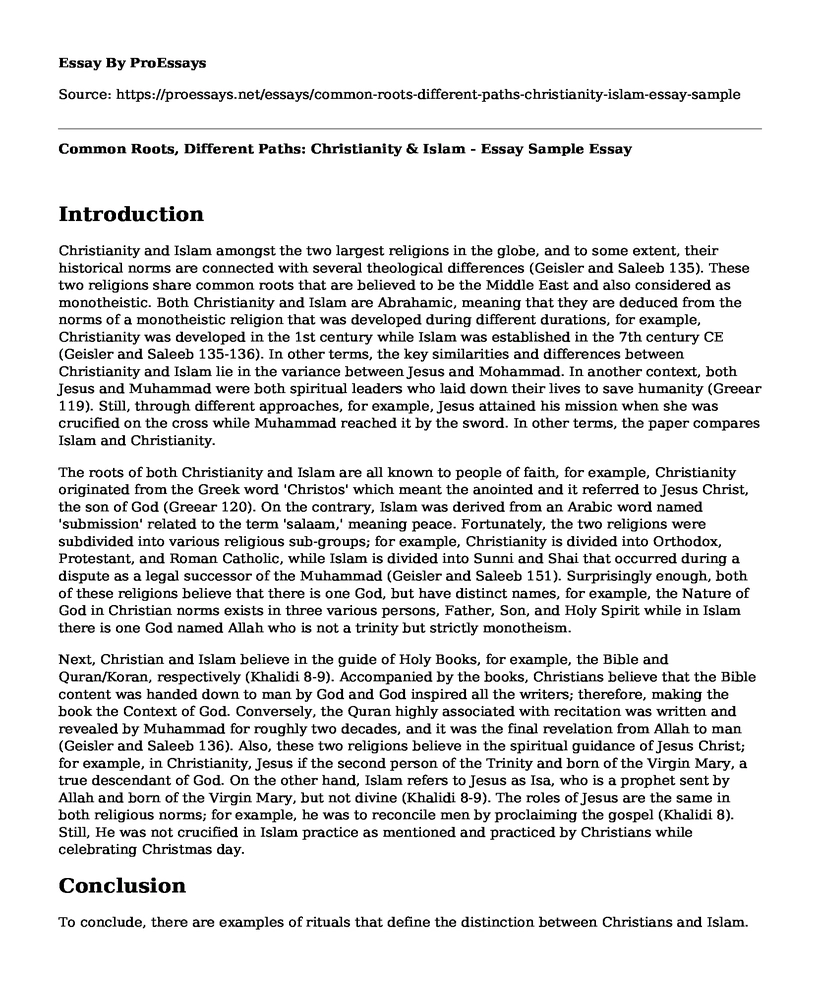Introduction
Christianity and Islam amongst the two largest religions in the globe, and to some extent, their historical norms are connected with several theological differences (Geisler and Saleeb 135). These two religions share common roots that are believed to be the Middle East and also considered as monotheistic. Both Christianity and Islam are Abrahamic, meaning that they are deduced from the norms of a monotheistic religion that was developed during different durations, for example, Christianity was developed in the 1st century while Islam was established in the 7th century CE (Geisler and Saleeb 135-136). In other terms, the key similarities and differences between Christianity and Islam lie in the variance between Jesus and Mohammad. In another context, both Jesus and Muhammad were both spiritual leaders who laid down their lives to save humanity (Greear 119). Still, through different approaches, for example, Jesus attained his mission when she was crucified on the cross while Muhammad reached it by the sword. In other terms, the paper compares Islam and Christianity.
The roots of both Christianity and Islam are all known to people of faith, for example, Christianity originated from the Greek word 'Christos' which meant the anointed and it referred to Jesus Christ, the son of God (Greear 120). On the contrary, Islam was derived from an Arabic word named 'submission' related to the term 'salaam,' meaning peace. Fortunately, the two religions were subdivided into various religious sub-groups; for example, Christianity is divided into Orthodox, Protestant, and Roman Catholic, while Islam is divided into Sunni and Shai that occurred during a dispute as a legal successor of the Muhammad (Geisler and Saleeb 151). Surprisingly enough, both of these religions believe that there is one God, but have distinct names, for example, the Nature of God in Christian norms exists in three various persons, Father, Son, and Holy Spirit while in Islam there is one God named Allah who is not a trinity but strictly monotheism.
Next, Christian and Islam believe in the guide of Holy Books, for example, the Bible and Quran/Koran, respectively (Khalidi 8-9). Accompanied by the books, Christians believe that the Bible content was handed down to man by God and God inspired all the writers; therefore, making the book the Context of God. Conversely, the Quran highly associated with recitation was written and revealed by Muhammad for roughly two decades, and it was the final revelation from Allah to man (Geisler and Saleeb 136). Also, these two religions believe in the spiritual guidance of Jesus Christ; for example, in Christianity, Jesus if the second person of the Trinity and born of the Virgin Mary, a true descendant of God. On the other hand, Islam refers to Jesus as Isa, who is a prophet sent by Allah and born of the Virgin Mary, but not divine (Khalidi 8-9). The roles of Jesus are the same in both religious norms; for example, he was to reconcile men by proclaiming the gospel (Khalidi 8). Still, He was not crucified in Islam practice as mentioned and practiced by Christians while celebrating Christmas day.
Conclusion
To conclude, there are examples of rituals that define the distinction between Christians and Islam. Christianity's perfect examples include the sacrament that provides for baptism as well as Holy Communion. Besides, Christianity has other practices such as Chrismation, marriage, penance, Holy Orders, and anointing of the ill as well as prayer. On the contrary, Islam believes in possession of faith, five-time prayer, almsgiving, fasting, and pilgrimage to the holy city of Mecca. Nonetheless, Christians inherited their sinful practice through Adam, who rebelled against God while Islam reflects on the origin of God.
Works Cited
Geisler, Norman L., and Abdul Saleeb. Answering Islam: The crescent in light of the cross. Grand Rapids, Michigan, United States: Baker Books, 2002.
Greear, J. D. Breaking the Islam Code: Understanding the soul questions of every Muslim. Eugene, Oregon, United States: Harvest House Publishers, 2010.
Khalidi, Tarif. The Muslim Jesus: Sayings and Stories in Islamic literature. Cambridge, Massachusetts, United States: Harvard University Press, 2001.
Cite this page
Common Roots, Different Paths: Christianity & Islam - Essay Sample. (2023, Mar 20). Retrieved from https://proessays.net/essays/common-roots-different-paths-christianity-islam-essay-sample
If you are the original author of this essay and no longer wish to have it published on the ProEssays website, please click below to request its removal:
- Religion Essay Example: How to Serve in Christian Faith
- The Challenge of Culture and its Impact on Faith/Spirituality and Social Justice: Expository Essay
- Research Paper on Muslim Culture and Healthcare
- Christianity as a Tool for Oppression in Brown's Clotel or The President's Daughter
- The Pagan Influence on Christianity Essay Example
- Essay on Providing Condoms at Christian Colleges: A Matter of Safety, Not Morality
- Covid-19 Crisis: Christians Call to Unite in Trust of Holy Spirit - Essay Sample







